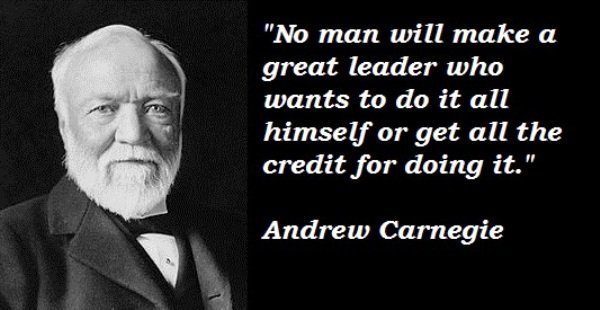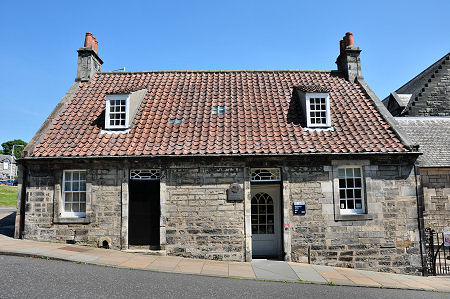
They say everyone is self-made but only the rich admit it. I say there are so many people, influences, and situations that play a hand in any one person’s success and or misfortunes.
How do we bridge the gap, limit the divide, and capitalise on the learning from both the wealthy and communities living in deprivation? Each with valuable lessons to share if only we are willing to listen. Each working themselves to the bone for a different cause, a cause unique to them.
How can we change the language that sets a derogatory tone from the get-go: disadvantaged, vulnerable, low income, low achieving to name a few? How can we learn to step back and “Stand not in judgement at what the poor have to carry, but stand in awe at how they carry it” (Gregory Boyle)
After visiting the Andrew Carnegie Museum on Tuesday, it sparked a whole host of questions, ones I feel need answered:
How does a man from humble beginnings reach such heights?

The answer is he had many people of influence behind him, including a family in Pittsburg offering a new life. He could decipher the morse code by ear, which set him apart and ahead. By his own admission, from a young age he had a hunger for learning and mother who could not only see but supported his potential. So, a combination of his own talents, combined with the opportunity to go to America, I believe all play a part in his story. Without the opportunity to emigrate would his talents have gone unnoticed.
How does he ensure his success is not in vain?
He ensures his success was not in vain through his philanthropic work. He quotes: “A man who dies rich, dies disgraced” he believed in the art of giving and could see the value in it.
What is his Legacy?
Libraries, museums, grants, hero awards the list is endless!
A beautiful museum with so many interesting facts around the man himself and the various steps that led him to become the richest man in the world.
Some Background
- Andrew Carnegie the Steel tycoon, stockbroker, writer, lecturer, entrepreneur, philanthropist - Andrew Carnegie was one of the great Scots of the 19th century.
- His life has left a huge legacy, but as his birthplace cottage testifies, he came from humble beginnings
- Andrew spent the first years of his life in a humble cottage in Dunfermline.
- In 19th century emigrated to America with just a few possessions.
- Set up his businesses in Pittsburgh, USA and became the richest man in the world.
- Andrew decided to give away 90% of his personal wealth and supported the founding of internationally renowned landmarks such as Carnegie Hall in New York, the Peace Palace in The Hague and the Mount Wilson Observatory in California.
- From humble beginnings to making links with Marie Curie, Helen Keller, Bertha von Suttner, Theodore Roosevelt and King Edward VII, together with landmark children’s TV show Sesame Street and the Diplodocus carnegii dinosaur! (1)
The big question is how a man from humble beginnings goes on to achieve such wealth; a wealth that is still supporting people to this day.
A wealth that opened libraries all over the world and allowed the famous gates of Pittencrieff Park to remain open forever. The Park gates had been closed to the public for many years, and when Andrew made his money, he bought the land, opened the park gates, and vowed they would never close again. The original key to the gate can be found within the cottage museum.
Was it his humble beginnings that was the catalyst for him sharing 90% of his money or the atrocity of his men that striked in the early days? Whatever the reason, there was something in Andrew that saw the legacy in paying it forward.
What can we learn from the richest man in the world?
More importantly how do we break stigma and stop people feeling like being poor is somehow a default within them.
How do we reach children at a young age and give them the tools they need so they too can prosper? With social media widening the gap of inequality and promoting a life out of reach for many, how do we offer an education that allows room for growth in all areas, one that allows them the possibility of success and an opportunity to make a difference.
How do we reach the children who don’t qualify for a sporting apprenticeship, sponsorship or funded education, how to we ensure no one is left behind?
What can we do in early education to tackle these issues in such a way that lifts the lives of young people, harnessing the message they already have but with the aim exposing them to other viable options?
We know from studies that young people living in poverty, who don’t thrive in the education system are more likely to be become involved in criminal justice, often starting with petty crime. How do we ensure they outwork the hand they were dealt?
Where is the message lost?
So many books, articles, and advice around ‘think rich, grow rich’ like it’s that easy. The rich say save, invest, track, which is all great advice if you are not high functioning in survival mode; when your number one priority is not to ensure your house is warm and there is food to eat. Never mind any additional costs associated with raising a family and running a home. That is advice is so valuable, but the message is lost for people struggling to make ends meet.
What message do we want to lose?
The media will report everything related to the worst outcomes for people living in poverty; life expectancy, risk of long-term illness, the effects of the ACES score, the limitations that prevent people from thriving. (2)
What they don’t talk about is what is working well.
They don’t talk about the community spirit, the sense of belonging, the village that surrounds people; 2022 and people still chapping neighbours’ doors to see if they need anything at the shop. The fact that no matter how many times you fall, as soon as you pick yourself back, the community is there to celebrate you. The community champions running various sports/writing/photography clubs for free.
You only must look at the Harvard study “Good genes are nice, but joy is better” to understand what matters most to people in terms of overall happiness. According to the Harvard study there is great value and lessons to be learned from people living in what is deemed as poverty.
The Harvard study, almost 80 years old, has proved that embracing community helps us live longer, and be happier. Close relationships, more than money or fame, are what keep people happy throughout their lives, the study revealed. Those ties protect people from life’s discontents, help to delay mental and physical decline, and are better predictors of long and happy lives than social class, IQ, or even genes. That finding proved true across the board among both the Harvard men and the inner-city participants. (2)(https://www.health.harvard.edu/blog/the-secret-to-happiness-heres-some-advice-from-the-longest-running-study-on-happiness-2017100512543
Also, to add to that when you look ‘The Top Five Regrets of the Dying’ written by Bronnie Ware there is no mention of finance anywhere.
"I wish I'd had the courage to live a life true to myself, not the life others expected of me."
"I wish I hadn't worked so hard."
"I wish I'd had the courage to express my feelings."
"I wish I had stayed in touch with my friends."
"I wish that I had let myself be happier."
Bronnie Ware is a former banker, palliative carer, singer and songwriter, international speaker and author of several books. She wrote this book to shine a light on the lessons we need to learn while we are still living. (3)
What message do we want to harness?
There is great freedom, self-esteem and sense of worth associated with financial freedom.
People living in deprivation are not broken.
No child born at any point gets to choose who they are born to.
Wealth is the result of intergenerational wealth, opportunities, exposure to education, a hunger for learning, commitment, the right contacts/connections. It includes a nurturing environment that allows one to grow. Adversity is the paradigm to that; the very skills, connections, opportunities that help one to prosper, is exactly the same for what holds people back. The agency does not lie with the child who has no choice.
We need to see people as they are; celebrate people and allow people to walk their own path. For the children, adults who want more; we need to bridge that gap and offer exposure and opportunities that help them, not only get from A to B, but onto to C and D and some.
References
- https://www.carnegie.org/interactives/foundersstory/#!/
- https://developingchild.harvard.edu/media-coverage/take-the-ace-quiz-and-learn-what-it-does-and-doesnt-mean/
- (https://www.health.harvard.edu/blog/the-secret-to-happiness-heres-some-advice-from-the-longest-running-study-on-happiness-2017100512543
- https://bronnieware.com/
